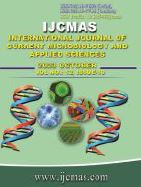


 National Academy of Agricultural Sciences (NAAS)
National Academy of Agricultural Sciences (NAAS)

|
PRINT ISSN : 2319-7692
Online ISSN : 2319-7706 Issues : 12 per year Publisher : Excellent Publishers Email : editorijcmas@gmail.com / submit@ijcmas.com Editor-in-chief: Dr.M.Prakash Index Copernicus ICV 2018: 95.39 NAAS RATING 2020: 5.38 |
With extremely high BOD, COD, and other harmful organic and inorganic elements, spent wash is among the most complicated and time-consuming wastewaters. Because of the presence of several water soluble, colouring chemicals and recalcitrant primarily melanoidins, distillery effluent maintains a very dark brown hue even after anaerobic treatment. The aim of the study includes standardising several criteria for the extraction of melanoidin pigment as well as the isolation and identification of bacteria from natural sources. Methods: Pseudomonas putida, a melanoidin-decolorizing bacterium, was isolated in a lab setting using the serial dilution technique, and the culture conditions were improved at different incubation temperatures, times, pH levels, carbon sources, and nitrogen sources. On 120 hours, or the fifth day of culture, the optimal decolorization (86.05%) of melanoidins were accomplished at pH 5 and 37 °C. Based on the results of optimising the culture settings, it was discovered that the chosen bacterial strain needs 1.5 gm of extra carbon (Dextrose) and 1.5 gm of supplementary nitrogen (Ammonium sulphate) in order to decolorize. After bacterial treatment, dextrose and ammonium sulphate are supplied to the effluent, which is both cost- and environmentally-friendly. By using bacterial strain Pseudomonas putida, this method of biological treatment successfully decolorizes melanoidin from distillery effluent.
 |
 |
 |
 |
 |